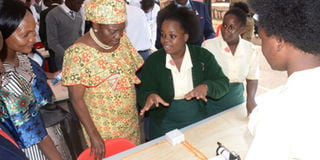Integrating vocational training and academics

Students of Gayaza High School expalin the circuit installation to the Speaker of Parliament Rebecca Kadaga during the Equilibrium competition last month.
Parents are increasingly questioning whether the time and money they invest in their children will pay off. There is no definitive answer as increasingly, some university graduates end up doing jobs similar to their colleagues that did not attend university.
Still, in a competitive job market, many graduates find that a degree is not always enough to secure a lucrative job offer. Employers also want workers who have hands on experience.
That’s where Jinja based Viva College School found at Mwiri Hill comes in. Their Wednesday afternoon Science and Innovation project classes offer students a way to gain professional work experience while enrolled in school full-time.
Students in non-candidate classes attend classes fulltime, then alternate between academics and vocational studies in their chosen field in the science and innovation project; candle and chalk making, detergents, bio-degradable paper bags, bridge building, art and craft as well computer repair and maintenance. This is reserved for Wednesday afternoon and Sunday afternoon. According to the students, these studies have been so rewarding and are providing a plan ‘B’ for the future.
Rewarding experience
But even with the prospect of a brighter future with many other possible pathways, vocational programmes can be a hard sell.
Jamil Kisaame, 14, a Senior Two student, was not keen on the idea initially as he was dreaming of becoming a footballer, an ambition he still harbours. But Kisaame, who says is a midfielder for the school team, was urged by friends to consider the programmes and says he has no regrets.
Now a member of the candle, chalk and liquid soap making as well as computer classes where he specialises in graphics, can do basic design, is fluent in video blogging and animations.
“The programme is helping me build my résumé, but it is also helping me find businesses that can make me earn now and in the future,” says Kisaame.
Emmanuel Kwikiriza, 16, a Senior Three student, is a member of the ICT class and says he was inspired by his inquisitive nature. “I wanted to learn how the computer works. I was taught how to type but I was curious to know how all those parts join to work. Today, I can assemble individual components as well as work on power supply problems and hard disk passwords,” he says. He, however, maintains his dream of becoming a journalist.
“I do not want to be employed the whole of my working life and you never know after practicing journalism, I can be able to repair other people’s computers for a pay,” Kwikiriza adds.
Self-sustaining
Of the more than 400 students at the school, 50 are members of the candle making class. Lyn Komuntale, 16, is the head of the club and says they were motivated by the unsteady power supply in the community.
“Ours are not ordinary candles because they are mosquito repellant,” Komuntale reveals. She says it is an economically viable business she can start for her planned charity towards orphans in the future.
“I now know where the raw materials (wax, strings, repellants, fragrance, colour and oil) and tools are available,” Kamuntale, who hopes she will be a pharmacist in future, notes.
Charting a course
During their time at school, students have an adviser to prepare them. That puts them a step ahead of other students later and serves them well throughout their careers. Most also build a professional network of contacts they can use to find their first job—as well as jobs later in their careers.
According to the acting principal, Stella Nkeramugaba, the science and innovation projects are key to the school. She says there are other clubs such as Viva Banker’s Club which in collaboration with the science projects mobilises funding for science projects and manages their savings. This investment club grooms the students’ entrepreneurial mind while imparting skills in good financial management.
Komuntale says this particular programme offered her the opportunity to learn careful spending habits. “You have to save to be able to start a business and that is important for me at this stage of my life,” she said.
As the country continues to push the need for hands on skills, schools need to jump on the drive and shape the students during their early stages of learning.




